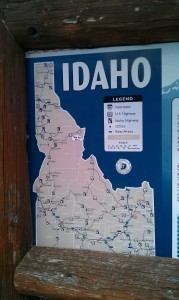Alison McGhee's Blog, page 43
August 20, 2011
Poem of the Week, by Taha Muhammad Ali
Revenge
- Taha Muhammad Ali (translated by Peter Cole)
At times … I wish
I could meet in a duel
the man who killed my father
and razed our home,
expelling me
into a narrow country.
And if he killed me,
I'd rest at last
and if I were ready -
I would take my revenge!
But if it came to light,
when my rival appeared,
that he had a mother
waiting for him,
or a father who'd put
his right hand over
the heart's place in his chest
whenever his son was late
even by just a quarter-hour
for a meeting they'd set -
then I would not kill him,
even if I could.
Likewise … I
would not murder him
if it were soon made clear
that he had a brother or sisters
who loved him and constantly longed to see him.
Or if he had a wife to greet him
and children who
couldn't bear his absence
and who his presents thrilled.
Or if he had
friends or companions,
neighbors he knew
or allies from prison
or a hospital room,
or classmates from his school…
asking about him
and sending him regards.
But if he turned
out to be on his own -
cut off like a branch from a tree -
without mother or father,
with neither a brother nor sister,
wifeless, without a child,
and without kin or neighbors or friends,
colleagues or companions,
then I'd add not a thing to his pain
within that aloneness -
nor the torment of death,
and not the sorrow of passing away.
Instead I'd be content
to ignore him when I passed him by
on the street – as I
convinced myself
that paying him no attention
in itself was a kind of revenge.
–
For more information on Taha Muhammad Ali, please click here: http://www.poetryinternational.org/piw_cms/cms/cms_module/index.php?obj_id=3181
–
Facebook: http://www.facebook.com/home.php?#!/pages/Alison-McGhee/119862491361265?ref=ts
Manuscript Critique Service:
http://alisonmcghee.com/manuscript.html
August 13, 2011
The world is too much with us
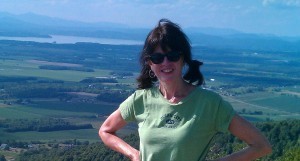 Sometimes, in order to be able to keep living with the knowledge of it all –the emaciated children, the chaotic climate, the debt ceiling, the S&P, the downed helicopters, the endless fighting, the everythingness of it and the almost-nothing you can do about it except write checks and write your Congresspeople and try to be a good person– you have to chuck it all and head to the mountains.
Sometimes, in order to be able to keep living with the knowledge of it all –the emaciated children, the chaotic climate, the debt ceiling, the S&P, the downed helicopters, the endless fighting, the everythingness of it and the almost-nothing you can do about it except write checks and write your Congresspeople and try to be a good person– you have to chuck it all and head to the mountains.
Go commando, which in this case means no t.v., no NPR, no newspaper, no wireless. Make your vow: a mountain a day.
Hope that at the end of the four days you will be better able to wade back into the fray. Hope that a small, still place inside will be able to stay small and still.
Begin at the beginning, at the base of the mountain. Old mountains. You should climb some new ones, you tell yourself. But you don't want to. You just want these mountains, the ones you've scrambled up and down many times before. You want the same views you've known for years and years.
Snake Mountain, for example. Snake is a long, undulating mountain, an easy hike where you know you're climbing but it's a slow climb on a former logging road turned wide trail. You've hiked this mountain for many years, beginning when you were eighteen.
You used to hike it with a friend who always ran down at top speed. He was, and is, more mountain goat than human,which meant that he could not not run down that mountain.
You've hiked Snake Mountain in the late night with friends, a few of you carrying flashlights, the rest of you intent on keeping your footing in the faint, zagging lines of light.
Once, in January a few years ago, you were teaching nearby for two weeks. You had an unexpected six-hour break and you jumped in your car and drove over to Snake. It was late afternoon and the sun would set soon. You tromped up the boot-beaten trail as fast as you could, the last rays of the sun turning the snow to diamonds. You couldn't make it to the top, though; it turned so dark, and you were alone, and you headed back down while you could still make out the trail.
Once, years ago, you and a friend headed up Snake in the late morning. At the first bend in the trail you encountered another hiker, a man wearing only hiking boots and known to you both now as Naked Man.
Once you and another friend climbed Snake at dawn in the late spring. This friend had climbed it and run it and skied it so many times that in his presence it felt like a different mountain, full of trails you'd never known about. He led, you followed. You had no idea where you were, but that didn't matter. Once in a while he stopped and squinted and you knew he was figuring something out and after a minute he would point and then you were moving again.
Now it's a summer day, hot and sticky, and you stand at the trailhead. Your phone has one bar. Despite the easiness of this hike, you text your sister where you are and that you should be back within a few hours. This is a routine you began many years ago, after you hiked up Mt. Washington on a gorgeous fall day. You were wearing a t-shirt and shorts and you had a sweatshirt and a water bottle and a granola bar and you were sweating. At the top a sudden blizzard started. Yes, that is what happens on Mt. Washington, and yes, you were that stupid person who thought it wouldn't happen to you.
You almost always hike alone because not many of your friends like to hike, or are free to hike, or have the flexible schedule that you do, or can take their work with them on the road the way you can.
Your youthful companions deeply dislike hiking, to the extent that they have mutinied on several mountains in the past. If a bear comes along, don't back away, you remember telling them once. Don't run. Talk, sing, wave your arms. You assumed that this bear advice would scare them into staying with you –it was your big gun of a threat– but no. Given the choice between a possible bear and the effort required to reach the summit, they would take the bear.
About half an hour into a hike, that feeling you crave begins to spread inside you. It's a kind of calm exhilaration. It's the same feeling you get when you run, but it's more intense. You're climbing. You're leaving the world behind. The sound of the road recedes. The sound of the birds intensifies. The wind is blowing the leaves of the trees and the higher you go, the stronger it blows.
Be fearless, you tell yourself. From now on, be fearless.
You don't know why this word comes to you. You start to ask yourself what you mean by it and you instantly decide that instead of thinking, you will just listen.
Long ago you were afraid to run down this mountain. You used to watch your friend's red head disappear below you on the trail. He ran fast, and he used to laugh as he ran. You hiked down like most people do, bracing your knees a little bit with each step.
There's a lot to fear in the world. Pick your poison: Bears. Mountain lions. Avalanches. Snakes. Car crashes. Bridge collapses. Tunnel cave-ins. Tornadoes. Sickness. Failure. Financial ruin. Loss. Violence. Heartbreak.
You used to be afraid of things you're not afraid of anymore. You remember one morning in particular, when you glanced out the window and saw a big black bird on the lawn, staring at you. You knew this meant that someone you loved was in great danger. All day you stalked around, trying to convince yourself that the omen wasn't real. You had tiny children then and you didn't know if you should take them out or if you should stay in. Was the danger outside the house, or was the danger inside, maybe down in a hidden, coiled pipe in the basement, a pipe that could explode?
That long-ago day passed without incident. No one, in the end, was hurt.
But you were, you think now, as you make your way up and up, through the green and shining trees. You were hurt. All that worry hurt you, and all that fear. All that wondering how you could possibly stop whatever was going to happen from happening, when you didn't even know what was going to happen.
It was better to let go. Think of your friend who knew Snake so well, all the hidden trails, and how you didn't think at all. You just trusted, and followed.
Here are the final yards of the hike, where the loam turns to grass. You're almost at the summit. You're still in trees, but you know from all the years you've hiked this mountain that only a few feet away is a view that will take your breath away. A group of men stands just ahead of you, gazing out at that view that you still can't see.
There is so much to be afraid of, if you let yourself be afraid. Take these men, this bunch of silent men standing on top of the mountain. Hikers, like you, right? Of course. But if you let yourself be afraid, you could tell yourself that you're alone, a woman, and they're a bunch of men, and there's no one else around. If you go down that dark path in your mind, you could start imagining all kinds of things, things that would make you turn around before you even step out onto the rock of the summit, before you even shade your eyes and look west.
If you let yourself be afraid like that, walk through the world in fear, you might turn around right now and start down the path, fast. You would hope they hadn't noticed you. You would tell yourself that you could hide in the woods if you had to, climb a tree if you had to.
Be fearless. You push on through the last few feet and emerge into the open sunlight. The men turn, and you say hello, and they say hello back, and then all of you turn back to look at the view.
That view. The Champlain valley spreads out below. To the west, across the river, are the Adirondacks where you grew up. Here, in the Green Mountains, they rise in the distance, a smoky blue-green.
You hold out your phone to the closest man.
"Take my picture?" you ask him.
On the way back down you think of your redhaired mountain goat friend, running. What were you afraid of? Falling? Why didn't you even try? How hard could it be?
Not at all, as it turns out.
The world is too much with us; late and soon. Getting and spending, we lay waste our powers. Little we see in Nature that is ours; we have given our hearts away. . .
The world is too much with us, late and soon
 Sometimes, in order to be able to keep living with the knowledge of it all –the emaciated children, the chaotic climate, the debt ceiling, the S&P, the downed helicopters, the endless fighting, the everythingness of it and the almost-nothing you can do about it except write checks and write your Congresspeople and try to be a good person– you have to chuck it all and head to the mountains.
Sometimes, in order to be able to keep living with the knowledge of it all –the emaciated children, the chaotic climate, the debt ceiling, the S&P, the downed helicopters, the endless fighting, the everythingness of it and the almost-nothing you can do about it except write checks and write your Congresspeople and try to be a good person– you have to chuck it all and head to the mountains.
Go commando, which in this case means no t.v., no NPR, no newspaper, no wireless. Make your vow: a mountain a day.
Hope that at the end of the four days you will be better able to wade back into the fray. Hope that a small, still place inside will be able to stay small and still.
Begin at the beginning, at the base of the mountain. Old mountains. You should climb some new ones, you tell yourself. But you don't want to. You just want these mountains, the ones you've scrambled up and down many times before. You want the same views you've known for years and years. You decide this is okay.
Snake Mountain, for example. Snake is a long, undulating mountain, an easy hike where you know you're climbing but you never have to scramble up rock faces or worry about losing your way. You've hiked this mountain for many years, beginning when you were eighteen.
You used to hike it with a friend who always ran down at top speed. He was, and is, more mountain goat than human,which meant that he could not not run down that mountain.
You've hiked Snake Mountain in the late night with friends, a few of you carrying flashlights, the rest of you intent on keeping your footing in the faint, zagging lines of light.
Once, a few years ago, you were teaching near here for two weeks in January. You had a six-hour break and you jumped in your car and drove over to Snake. It was late afternoon and the sun would set soon. You tromped up the boot-beaten trail as fast as you could, the last rays of the sun turning the snow to diamonds. You couldn't make it to the top, though; it turned so dark, and you were alone, and you headed back down while you could still make out the trail.
Once, years ago, you and a friend headed up Snake in the late morning. At the first bend in the trail you encountered another hiker, a man wearing only hiking boots and known to you both now as Naked Man.
Once you and another friend climbed Snake at dawn in the late spring. This friend had climbed it and run it and skied it so many times that it felt like another mountain to you, full of trails you'd never known about. He led, you followed. You had no idea where you were, but that didn't matter. Once in a while he stopped and squinted and you knew he was figuring something out and after a minute he would point and then you were moving again.
Now it's a summer day, hot and sticky, and you stand at the trailhead. Your phone has one bar. You text your sister where you are and that you should be back within a few hours. This is a routine you began many years ago, after you hiked up Mt. Washington on a gorgeous fall day. You were wearing a t-shirt and shorts and you had a sweatshirt and a water bottle and a granola bar and you were sweating. At the top a sudden blizzard started. Yes, that is what happens on Mt. Washington, and yes, you were that stupid person who thought it wouldn't happen to you.
You almost always hike alone because not many of your friends like to hike, or are free to hike, or have the flexible schedule that you do, or can take their work with them on the road, the way you can.
Your youthful companions deeply dislike hiking, to the extent that they have mutinied on several mountains in the past. If a bear comes along, don't back away, you remember telling them once. Don't run. Talk, sing, wave your arms. You assumed that this bear advice would scare them into staying with you, but no. Given the choice between a possible bear and the effort required to reach the summit, they would take the bear.
About half an hour into a hike, that feeling you crave begins to spread inside you. It's a kind of calm exhilaration. It's the same feeling you get when you run, but it's more intense. You're climbing. You're leaving the world behind. The sound of the road recedes. The sound of the birds intensifies. The wind is blowing the leaves of the trees and the higher you go, the stronger it blows.
Be fearless, you tell yourself. You don't know why this word comes to you. You start to ask yourself what you mean by that and you instantly decide that it's better not to think about it.
Long ago you were afraid to run down this mountain. You used to watch your friend's red head disappear below you on the trail. He ran fast, and he used to laugh as he ran. You hiked down like most people do, bracing your knees a little bit with each step.
There's a lot to fear in the world. Pick your poison: Bears. Mountain lions. Avalanches. Snakes. Car crashes. Bridge collapses. Tunnel cave-ins. Tornadoes. Sickness. Failure. Financial ruin. Loss. Violence. Heartbreak.
You used to be afraid of things you're not afraid of anymore. You remember one morning in particular, when you glanced out the window and saw a big black bird on the lawn, staring at you. You knew this meant that someone you loved was in great danger. All day you stalked around, trying to convince yourself that the omen wasn't real. You had tiny children then and you didn't know if you should take them out or if you should stay in. Was the danger outside the house, or was the danger inside, maybe down in a hidden, coiled pipe in the basement, a pipe that could explode?
That long-ago day passed without incident. No one, in the end, was hurt.
But you were, you think now, as you make your up and up, through the green and shining trees. You were hurt. All that worry hurt you, and all that fear. All that wondering how you could possibly stop whatever was going to happen from happening, when you didn't even know what was going to happen.
It's better to let go. Think of your friend who knew Snake so well, all the hidden trails, and how you didn't think at all. You just trusted, and followed.
Here are the final yards of the trail, where it turns to grass. You're almost at the summit. You're still in trees, but you know from all the years you've hiked this mountain that only a few feet away is a view that will take your breath away. A group of men stands just ahead of you, gazing out at that view that you still can't see.
There is so much to be afraid of, if you let yourself be afraid. Take these men, this bunch of silent men standing on top of the mountain. Hikers, like you, right? But you're alone, a woman, and they're a bunch of men, and there's no one else around, and if you go down a dark path in your mind, you could start imagining all kinds of things. You could imagine things that would make you turn around before you even step out onto the rock of the summit, before you even shade your eyes and look west.
If you let yourself be afraid, you would turn around right now and start down the path, fast. You would hope they hadn't noticed you. You would tell yourself that you could hide in the woods if you had to, climb a tree if you had to.
You push on through the last few feet and emerge into the open sunlight. The men turn, and you say hello, and they say hello back, and then all of you are quiet.
The Champlain valley spreads out below. To the west, across the river, are the Adirondacks where you grew up. Here, in the Green Mountains, they rise in the distance, a smoky blue-green. The world is too much with us; late and soon, getting and spending, we lay waste our powers. Little we see in nature that is ours; we have given our hearts away.
You hold out your phone to the closest man.
"Take my picture?" you ask him.
On the way back down you think of your redhaired mountain goat friend, running. What were you afraid of? Falling? Why didn't you even try? How hard could it be?
Not at all, as it turns out.
Poem of the Week, by Leah Goldberg (translated by Annie Kantar)
Then I Walked Through the World
Then I walked through the world
as though someone adored me.
Laughter unfurled through heaps of stones,
and a wind through fathomless skies.
Then I walked through the world
as though someone dreamed me fair.
Across the night abysses bloomed
and the sea's mirrors painted my face,
as though someone were writing poems about me.
I walked, until I reached an utter stillness within:
then, it seemed, something might begin.
–
For more information on Annie Kantar, please click here and here:
–
For more information on Leah Goldberg, please click here:
July 30, 2011
Poem of the Week, by Derek Walcott
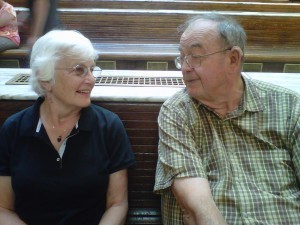 Love after Love
Love after Love
- Derek Walcott
The time will come
when, with elation,
you will greet yourself arriving
at your own door, in your own mirror,
and each will smile at the other's welcome,
and say, sit here. Eat.
You will love again the stranger who was your self.
Give wine. Give bread. Give back your heart
to itself, to the stranger who has loved you
all your life, whom you ignored
for another, who knows you by heart.
Take down the love letters from the bookshelf,
the photographs, the desperate notes,
peel your own image from the mirror.
Sit. Feast on your life.
–
For more information on Derek Walcott, please click here: http://www.poets.org/poet.php/prmPID/220
–
Facebook: http://www.facebook.com/home.php?#!/p...
July 23, 2011
Poem of the Week, by Li-Young Lee
From Blossoms
- Li-Young Lee
From blossoms comes
this brown paper bag of peaches
we bought from the boy
at the bend in the road where we turned toward
signs painted Peaches.
From laden boughs, from hands,
from sweet fellowship in the bins,
comes nectar at the roadside, succulent
peaches we devour, dusty skin and all,
comes the familiar dust of summer, dust we eat.
O, to take what we love inside,
to carry within us an orchard, to eat
not only the skin, but the shade,
not only the sugar, but the days, to hold
the fruit in our hands, adore it, then bite into
the round jubilance of peach.
There are days we live
as if death were nowhere
in the background; from joy
to joy to joy, from wing to wing,
from blossom to blossom to
impossible blossom, to sweet impossible blossom.
–
For more information on Li-Young Lee, please click here: http://www.poetryfoundation.org/bio/li-young-lee
July 22, 2011
- and comes that other fall we name the fall
 Once upon a time you and your sister Oatie spent the summer in Colorado. This was the summer after you graduated from college, the summer after her junior year in college.
Once upon a time you and your sister Oatie spent the summer in Colorado. This was the summer after you graduated from college, the summer after her junior year in college.
You spent a week at home, waiting for Oatie to finish up with school, and then you flew out together. It was Oatie's first time spending the summer away from home. You talked her into it.
"Come on," you said. "It's just for the summer. You can have my old job at the hotel."
You had spent the summer out there two years before, and the manager of the hotel was happy to hire your sister and give you both a place to live, in Apartment B.
"Cleaning rooms?"Oatie said. "Vacuuming the hallways?"
"Yeah!" you said. You stuck an exclamation mark into your voice. "It's fun!"
Out you went, the both of you, on the plane instead of the Greyhound you originally planned to take. That was because you had broken your leg the last week of college, falling off your bike at the end of a long ride. All those hills, all those miles, and you chose to fall off while going three miles an hour across the grass to the dorm.
Snap.
You knew it was broken because of the snap, but because you didn't, and still don't, swell, you had to convince the doctor to x-ray it.
The broken leg was a hindrance —hard to waitress with a broken leg, even one in a walking cast, and waitressing was what you wanted to do. Tips, which you loved. Hustle and bustle, which you loved. Free meals in the kitchen on break, always a plus.
Oh well. Goodbye waitressing. Broken leg or not, you were going to Colorado for the summer, and Oatie was coming too. The two of you bought one-way tickets to Denver. From the airport you took the hound to the ski town up in the mountains, and up the wide, carpeted spiral ramp to Apartment B.
Why is this summer so much on your mind these days? You don't really know. Three short months, was all it was. You and Oatie, living on your own together the way neither of you ever had. It was always she and Robert John –your other sister, the one with the male nickname– who had shared a room. She and Robert John who had their own language, their own shared routines.
But here you were, the two of you. Oatie cleaned rooms at the hotel, vacuumed the hallways, polished the windows and wrought iron railing of the wide circular ramp that led from the first to the third floor of the three-story hotel.
You tromped around the streets of the town in your walking cast, looking for work. You found a job at another hotel, at the front desk. You liked the manager there, and his girlfriend; he was bold and funny, she was kind, with golden curls and an air of sadness that never went away.
"Winter is wonderful, but summer is why we live here."
That was the quote on the poster that was everywhere in that town, that summer. You had never been to the town in winter. You didn't ski, but you were a hiker, and the hikes there were endless and every one was beautiful.
Not that you could hike, with the broken leg. You counted on it healing fast, so that you could squeeze in a few weeks of hiking at the end of the summer. Did you? You remember the cast coming off, and the shock of how skinny and hairy and creepy-looking a leg can get in just six weeks.
Enough with the broken leg. The leg is not what you remember, when you think of that summer.
You remember Oatie, dragging herself into Apartment B at the end of a long day of cleaning. You remember how she used to fling herself onto the couch and moan about how the basement had flooded again, how she had to use the wet-vac again, how she just wanted a beer.
"Again! I was down there for HOURS with the wet vac! HOURS!"
You, meanwhile, had spent the day at the front desk of the hotel, doing little but taking reservations, checking people in, and typing story after story on the hotel typewriter. That's all you wrote back then: short stories, all gone now.
You remember teaching Oatie how to sneak food from the daily deliveries to Dos Amigos, the Mexican bar and grill accessible from the second floor of the hotel. "Steal" would be a more accurate term, harshly accurate. Crates and crates of avocados and tomatoes and onions and lettuce –guacamole and nachos– stacked in the basement.
Just one or two would be okay, right? No, but you took them anyway.
Halfway through the summer Oatie got a crazed gleam in her eye and started coming back to Apartment B with three, four, five of each. That was Oatie. Never one for half-measures.
"I'm tired of being poor!" she wailed.
How could you blame her? Neither of you had any money, and Oatie liked to spend it, not conserve it. You were stern, though.
Homemade English muffins. Homemade split pea soup. Endless bowls of oatmeal. Stir fry. A bottle of cheap vodka to drink before you went out, so as not to ring up a big bar tab.
These are some of the things you and Oatie snicker about on the phone when you remember that summer. When you want to make her laugh, all you have to do is leave her a voicemail or post a message on her page:
"English muffins! Split pea soup! Oatmeal!"
And she will call you back and off you go, back into the past, into that long-ago summer.
Remember the mountain man?, she will say, and you will conjure the mountain man. He came walking into town with a dirty backpack and hiking boots that had seen hundreds of miles of mountains. He was hiking across the country in memory of his dead friend. The mountain man had sandy hair and blue eyes and he, too, emanated sadness.
You and Oatie offered the mountain man shelter. Sure, he could stay with you for a few days. The mountain man washed his clothes and took a shower and came out to the disco with you and Oatie and your other summer friends. He made dinner for you and Oatie and your friend Erin: lasagna.
He didn't boil the noodles first. This was the first time you had ever considered that it might be possible to make lasagna without first boiling the noodles. You have made it this way ever since. Just add more liquid.
You remember dancing with the mountain man to a slow song, and how you could feel his loneliness, and how long it had been since he touched a girl. You could sense how much he was holding inside during those few days he spent with the two of you before he put the pack back on and headed out of town.
More of your friends came through that summer, and you and Oatie housed and fed them all. You especially remember Tom and Steve, and how they came running up the wide circular ramp, laughing. How, the day they left, they drove to the grocery store and came back with bags of groceries, groceries that were more than oatmeal and flour, and stocked your cupboards. You were sad to see them go.
"You have such great friends!" Oatie would say.
It was true. It still is.
You remember how every afternoon, around one o'clock, clouds would abruptly mass over the town. Awnings would be pulled out. The scrape scrape of chairs being quickly dragged inside. Then would come a brief, pounding rain, and just as abruptly, the skies would clear. The sun would shine down on the shining pavement.
From the balcony of Apartment B that smell, the smell of wet pavement, would drift upward. The air would feel rinsed and cool.
You remember hitching to the Stop 'n Shop down the highway, to save money at a big store instead of the cute little pricey store in town. You and Oatie standing by the highway, thumbs in the air. Hitching back with the heavy paper bags. Lugging flour and oatmeal and peas, rice and vegetables and oil, back to Apartment B.
If you look at that photo up there you can see the big bag of flour, the oatmeal, the bottles of vegetable oil.
You remember the other residents of the hotel, the ones who, like you and Oatie, were working in town for the summer and renting rooms. Jerry leaps into your mind. Jerry who seemed to spend most of his time in the room he shared with two others, the three of them crammed into an ordinary-sized hotel room to save money.
Jerry ironed a lot. Jerry wore his bathrobe much of the time. Jerry talked incessantly of Europe, and to be told that your outfit looked European was a high compliment from Jerry. Jerry was funny, so funny. His constant gossip was always unkind but never truly unkind.
One of his roommates was silent Paul, tall blonde silent Paul who left early every morning for work. His other roommate was. . . who was he? That is the kind of question that Oatie can answer.
Now, so many years later, you look back and think of Jerry and wonder if he was caught by the disease that caught so many back then. It was that fall, when you left Colorado and moved back east, that the mutterings began, and spread, and then the disease itself spread, and laid waste to thousands.
You remember feeling lonely. You remember not knowing what waited for you, once you left the town and headed back east. One of your closest friends was getting married in early September and you were in the wedding; that was the end date to your summer. But after that? You remember not knowing what in the world would happen to you.
You wanted to live in Vermont, but where and how? You longed for a boy who lived there, but you knew he didn't feel the same way. Your best friend was moving to Boston. Your other friends all seemed to have plans. You pretended you had a plan. But you didn't.
Oatie was going back to school. She was safe. You did not feel safe.
All you knew was that you wanted to be a writer. You sat at that front desk at the hotel typing away, story after mediocre story, and was that how a person got to be a writer?
You had no idea.
June 30, 2011
The things you never knew
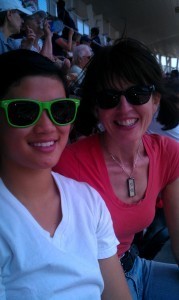 You and the most youthful of your youthful companions are on a road trip, one that will eventually cover 3615 miles in a couple of weeks. Basic arithmetic will tell you that means a lot of hours in a car, covering a lot of road. A lot of nights at drive-up motels. A lot of meals at roadside diners. A lot of time in which to discuss a lot of things.
You and the most youthful of your youthful companions are on a road trip, one that will eventually cover 3615 miles in a couple of weeks. Basic arithmetic will tell you that means a lot of hours in a car, covering a lot of road. A lot of nights at drive-up motels. A lot of meals at roadside diners. A lot of time in which to discuss a lot of things.
Your youthful companion has been with you for all but the first seven months of her life. You think you know her about as well as someone can know another person. Certainly she is not a mystery to you.
Or is she?
These are a few of the things that you can learn, over the course of 3615 miles in two weeks, about someone you thought you knew well:
She hates the word "curdled."
Due to splaying of limbs, you do not want to attempt to share a bed, even a kingsize bed the size of a toddler's football field, with her.
She is capable of consuming a frightening amount of sugar in a frighteningly short time, prompting feelings of tremendous guilt and anxiety in her older companion, who harbors the knowledge that her youthful companion's older brother literally did not know the word "candy" until he was 2.5 years old.
Having seen Food Inc., she will scan all menus in an attempt to determine the provenance of their meat entrees.
Her knowledge of world geography far exceeds yours. Show her a blank map of Africa, and she will name each nation, and she will be right.
Not only does she wear a Hanes V-neck t-shirt each and every day, but she will describe said t-shirt as her "signature look," a phrase you would not have guessed she knew.
Nothing, not even the promise of enough money within a few weeks to purchase the one-speed retro bike she covets, can convince her that babysitting is a worthwhile job.
"But what if it was just one perfectly behaved child?"
"No."
"What if it was just one perfectly behaved child who was already asleep?"
"No."
"What if it was just one perfectly behaved child who was already asleep and the house had satellite t.v. and tons of treats and they were paying you like ten dollars an hour?"
"No."
You will learn that she is stalwart and unflinching in her convictions.
You will learn that not only does she naturally possess what you have long called her "Death Stare," but she has worked over the years to refine it, especially when walking the halls of her high school. You will learn that it is not just her who possesses the Death Stare, but her older brother and sister as well.
"When they were in high school they were known for it too. I'm just carrying on the family tradition."
You will learn that she is a tougher customer than you originally thought, and you originally thought that she was, in fact, tough.
A pitcher is having a bad day, for example. A very bad day, so bad that you feel sorry for him and venture a sad remark on his behalf. The youthful companion's response?
"He should get off his butt and throw strikes."
Her hardass-ness is a bit unnerving, in fact. Does she take this hardline approach with, say, you? Does she look at your life and the way you lead it and think something along the lines of, "She should get off her butt and throw strikes"?
In light of the youthful companion's uncompromising standards, you naturally begin to examine your own behavior. How is your driving, for example? Maybe you shouldn't be going quite this fast. How is your language? Maybe you should try to rein in your cursing. How is your demeanor? Maybe you are not being pleasant and helpful to the best of your abilities.
You look over to your right at the youthful companion. She is wearing the enormous green sunglasses you bought her at Wall Drug. Behind them, the Death Stare, if it is present, is invisible. She looks calm.
Then again, she usually looks calm.What might she be thinking, right at this very moment? Might she be reviewing your behavior in her mind, calculating your many deficiencies? You imagine being back in high school, slinking down the side of a crowded hall, trying not to attract attention. Down the hall toward you comes a calm-faced girl with dark brown eyes. You pray she does not look in your direction, as she is the girl of the famous Death Stare.
This scene is a little too easy to imagine. You sneak another look over at her. In truth, she's a little bit scary. You wouldn't want to mess with her. Thank God she's with you, and not agin you.
Or is she? Horror movie music starts to hum in your mind.
Another 1000 or so miles to go.
June 25, 2011
"You ought to have seen what I saw on my way. . ."
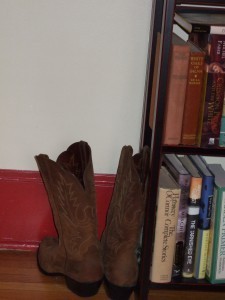 You buy a pint of blueberries at the farmer's market. Or, if your city backyard just happens to be overgrown with blueberries, you pick them yourself.
You buy a pint of blueberries at the farmer's market. Or, if your city backyard just happens to be overgrown with blueberries, you pick them yourself.
Then you lie on your porch swing with a book and the pint of blueberries at your side. Reach in for a handful without looking and toss them into your mouth. Tasty, juicy, blueberryness.
Later that day you get a craving for some more blueberries. Back to the pint you go. Now you sit at the kitchen table and eat them more carefully – there are fewer left.
As the number of blueberries dwindles, you become more selective. No more handfuls tossed blithely down. Now you examine each blueberry. Before long you're eating them one by one, each time selecting the biggest. Each time, the biggest and bluest becomes the best. Each time, you're happy to be eating the best blueberry.
Only when you're down to the last four or five blueberries does it occur to you that, compared to the beginning, when the pint was full of plump dark berries, these last four or five are runts. Shriveled, tiny, bruised. Overly examined.
You and your youthful companion have been traveling for days, through the sweeping Dakotas, Montana, Alberta, Idaho, Montana again, and Wyoming. Miles and miles and miles a day you drive, with your youthful companion in the seat next to you playing dj, navigator and personal assistant. ("Where did I put my sunglasses, youthful companion?" "You're sitting on them.")
The youthful companion, usually a car sleeper, doesn't sleep. Her eyes, like yours, roam from side to side all day long.
"There's so much to see," she says.
So much to see, out here in the west, where in most states the entire population is less than the population of the city in which the two of you live. Snow-capped mountains rise up in the distance over the rolling plains. A constant wind ruffles the prairie grass into undulating sheets of green-yellow-blue that look like ocean waves, and this land was once an ocean.
Dark cattle lie in the sun or graze on the slopes or stand drinking at the edge of creeks. Horses stand motionless, long tails flicking flies away. Thousands of acres of grassland stretch in every direction, broken only by the dirt roads that lead to a distant houses separated by miles. Pickups rattle over cattle guards underneath iron ranch gates.
"I want to live out here," says the youthful companion.
"Me too."
"I don't want to go back."
"Me either."
Silently you drive. You think about your house in the city, the tiny city lot, the block with all the other houses and duplexes and apartment buildings. You picture your back yard with its raised vegetable bed, all the perennials you've planted, the little patch of grass that you trundle the reel mower over every couple of weeks.
You feel tired at the thought of the city: the traffic, the noise, the minutiae of it all.
In the city, tiny things take on great significance. You have watched neighbors turn an apple tree and its dropped fruit –a branch that overhangs into one neighbor's yard– into years-long warfare. You have watched surveyors take minute measurements to settle a 6″ fence differential argument. Your neighbor and you watched in horror one day as four men from the city chopped down the tree across the street, on orders from the sunlight-craving homeowner who lives behind it. You yourself have called the cops at 3 a.m. to silence the party house down the block.
The smaller and more crowded something gets, the more significance is attached to it.
"It's good to be away from everyone and everything I know," says the youthful companion.
"I know," you say.
And you do. Out here, these endless miles, this sweep of sky, driving 80 across the empty road or 25 on the narrow guardrail-less roads that wind around and around and around the snowy mountains, you realize your own insignificance. Here, in the great beyond, you're a speck.
"Can we live out here?" asks the youthful companion.
"Sure," you say.
It's become your habit to say "sure" to everything the youthful companion asks. Try it sometime. It's like a lullaby. Can I. . . ? Sure. Will you. . . ? Sure. What if. . .? Sure.
"No, I mean really," she says, unsmiling. "Can we?"
"Yes," you say, and you mean it, because you want this too.
You want this enormous land, this vast sky. You picture the 6×12′ raised bed in your back yard, no doubt weed-ridden by now without you to hover over it, and you look to your right and to your left and behind you and ahead of you and all there is, is space. Space in which an extra foot or so, a patch of weeds, mean nothing. You are nothing, ultimately, but a traveler passing through an endless land.
The west is the full pint of blueberries.



